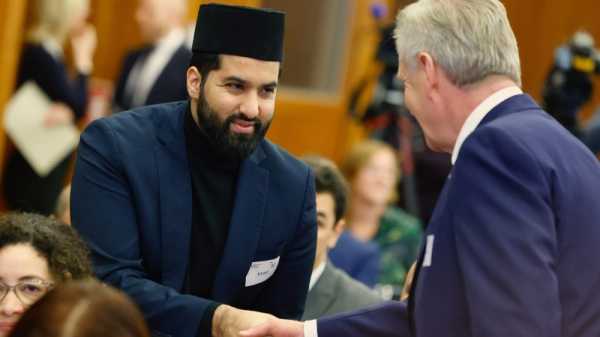
Representatives of the Muslim community in Germany are concerned about increased marginalisation and a rise in Islamophobic incidents amidst a heated debate around anti-Semitism.
Germany is home to some 5.5 million Muslim citizens – one of the biggest communities in Europe.
Since the 7 October Hamas terrorist attack on Israel that killed 1,200 people and the subsequent Israeli bombardment of Gaza that has claimed over 14,800 lives to date, German Muslims have felt increasingly alienated by the public discourse as they grapple with accusations of anti-Semitism and a spike in Islamophobia.
“The blanket suspicion towards Muslims, the de-facto marginalisation of Muslim interests and the voice of Muslims has created a serious [crisis of confidence] that we will have to deal with for years,” Aiman Mazyek, chair of the General Council of Muslims in Germany (ZMD), told reporters on Monday (27 November).
Media and political leaders have highlighted recent anti-Semitic incidents, including small crowds that appeared to be celebrating the Hamas attack in migrant-dominated quarters of Berlin, and caliphate flags shown at pro-Palestinian protests.
Many Muslims feel like they are being held responsible for the actions of a few people.
“Politicians keep saying we must not make Muslims general suspects, but every sentence that follows makes them general suspects,” Sharjil Khalid, the imam of an Ahmadi mosque in Berlin, told Euractiv.
His community had vocally condemned the Hamas attack, he said, pointing out that Ahmadis, a Muslim branch originating in what is now Pakistan, reject all violence by default.
Islamophobia overlooked
In parallel with a surge in anti-Semitic incidents, German Muslims have also seen a surge in hatred directed at them.
In the second half of October, the number of anti-Muslim incidents has increased to three a day on average, including ten attacks on mosques, with a “high number of undetected cases”, according to CLAIM, a government-supported non-profit.
Khalid and Mazyek described an atmosphere of intimidation, with a spike in attacks on women wearing a hijab and Muslim students being singled out and challenged on their views by teachers.
Islamophobia is often overlooked in Germany, as Euractiv reported last December.
A report conducted by the German Centre for Integration and Migration Research (DeZIM) before the October attack found that since 2017, between 700 and 1,000 cases of Islamaphobic crimes have been reported to the police, with many others believed to go unreported.
It also found that one in two people in the country agree with anti-Muslim statements.
Troubled dialogue
Meanwhile, a public debate shaped in part by Germany’s historical guilt for the Holocaust has left little room to embrace Palestinian grief too, some observers say.
Khalid argued that young Muslims particularly felt German media and leaders had failed to address the suffering of Palestinian civilians.
“Nobody denies that Hamas is a terror organisation, that they have started this and that they abuse civilians, but for many people, it is hard to understand that thousands of Palestinian children who have died [in Israel’s retaliation] are not being addressed with the same vigour by the German government,” Khalid said.

Germany reaffirms backing of two-state solution for Palestine
The German government insisted on Monday that it continues to back the two-state solution to resolve the Israeli-Palestinian conflict but stated that Israel’s protection was more pressing.
“We can’t give up on [a two-state] solution because there hasn’t been a better …
The government has also been criticised for how it has handled the issue, in particular at the most recent Islam Conference (DIK), a forum initiated by the Interior Ministry to bring Muslim communities, the state, and civil society together.
Last week’s edition ran into controversy when the theme was switched from Islamaphobia to anti-Semitism while the country’s largest Muslim organisation, ZMD, was not invited for unspecified reasons.
Khalid, who attended the DIK, said it felt like Muslims were being “talked about but not talked to”.
Interior Minister Nancy Faeser mostly called out Muslim anti-Semitism in her speech and left shortly after – due to what a ministry spokesperson called time pressures.
Addressing antisemitism
Still, Germany’s Muslims, including their religious leaders, face pressure from civil society to address anti-Semitism coming from within their ranks.
“In this situation, Islamic organisations should primarily address Muslims and, in my view, very little is coming from them. […] Public statements are nice but they don’t achieve anything,” Josef Schuster, the president of the General Council of German Jews, told Euractiv, adding, though, that he did not believe in “compartmentalising anti-Semitism”.
“Currently, Islamist anti-Semitism is evident in Germany and puts Jews in danger. However, we should not believe that right-wing anti-Semitism has suddenly disappeared,” Schuster said.
Lamya Kaddor, a leading Green MP and influential advocate for Muslim causes, agreed that the duty lies with associations but warned against making Muslims blanket suspects.
“It’s important to distinguish between private Muslim citizens and Islamic organisations,” Kaddor told Euractiv.
Muslim representatives emphasised that it was now vital to make it clear that Jews and Muslims ultimately shared the same interests.
“If this war escalates and draws in other countries, it will be the greatest danger for all of us; if we don’t start calling for moderation everywhere, it will destroy everything sacred to anyone,” Khalid said.
[Edited by Alice Taylor/Zoran Radosavljevic]
Read more with EURACTIV

Majority of Britons support rejoining the EU single market – pollA majority of Britons support rejoining the European Union’s single market even though that would mean the restoration of the free movement of workers from the bloc, according to a poll published on Wednesday (29 November).
Source: euractiv.com



